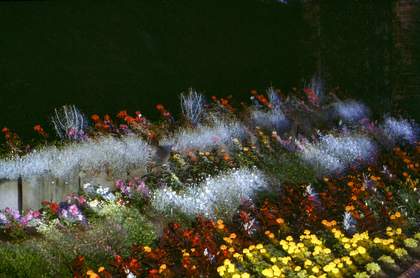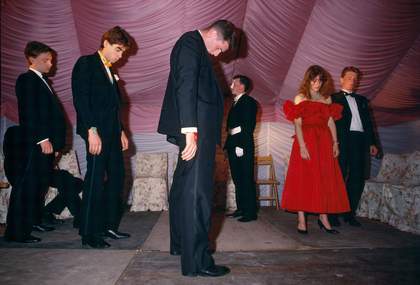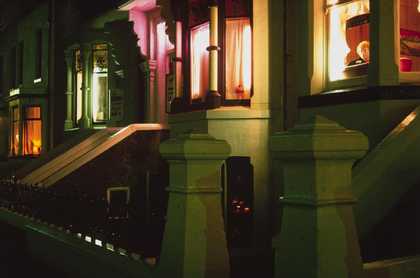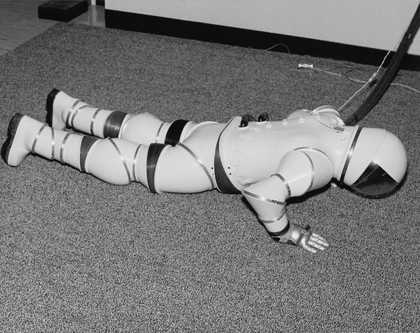
Brockwell Park Flower Garden, London
from Chris Steele-Perkins, The Pleasure Principle 1980–9
© Chris Steele-Perkins / Magnum Photos
I suppose that if you are not entirely white, you are never entirely British.
True, I was not black; I did not wear exotic costumes, but as a child I felt isolated. I am sure most kids have this feeling sometimes, but perhaps those who carry it longest and deepest are the ones driven to write, comment, photograph.
My father was English, a military officer who abandoned by Burmese mother, and brought me back to England at an early age. In the small seaside town where we lived there was no ethnic community into which I could comfortably retreat. I was seen as a Chink. So, in the heartland of Anglo Saxon England I forged the peculiar bonds that bind me to this country.
My childhood sensitivity to racial difference was not all-consuming, it merely exerted a steady pressure throughout those years. It was gradually buried in a dissolute and extended adolescence, and later made ridiculous by a growing sense of personal worth.
Resentments, which impeded my perception of worth in others, began to fall away, sometimes too late. People died before I was able to properly express to them the strength of my admiration and love. They were English.
So, gradually, the alienation – so much part of my childhood – faded. Not into complacency, but into a form of understanding; a larger, clearer picture of one’s society. My Country. Or so it seemed.
Then I started to travel in the Third World.
Previously my work had been focused on particulars of Britain: poverty, sub-culture. I did not have any parallel reality against which to properly assess my position.
Exposure to other cultures, the massive shifts in relationships to people, the direct confrontation with the fact that things are different. Really different: worse, better, harder, more dangerous, shocking, fabulous, relaxed, harmonious… A kaleidoscope of experiences, of often extraordinary power, could not help but change my relationship to England.
I returned from the Third World looking at a broader framework than before, and with a touch of culture-shock. I could no longer retreat into the strangely reassuring idea that I was a victim (in some indeterminate way) of this society and so forego personal responsibility by posturing as an Outsider. For I could travel the world. I had become part of a larger community. I had shared food, hardship, laughter, friendship with people from widely different cultures. I had witnessed, photographed, and wept for the victims of the world. The starving, the dispossessed, the oppressed; those with no hope but their indominatable spirit.
Travel re-activated my buried sense of apartness from England, but not with the old feeling of oppression, for now I had a different perspective. Now there was a sense of almost anthropological detachment, a heightened sense of life’s oddity, and the peculiarly surreal forms it takes in England. This was coupled with an appreciation of those qualities of Englishness I had not properly realised that I valued, such as the traditions – however flawed – of democracy, a rough tolerance, a capacity for self-mockery, a stoutness of spirit. Yet the mindless aggression, the hypocrisy, the chauvinism that narrows horizons and twists perspectives became even more detestable.
During these last years my major output has been in photographing abroad. I have continued to photograph in England, but in a way that tried to deal with a sense, a feeling about the quality of this country. I was not interested in polemics, or a fashionable cynicism. I wanted to re-orientate myself. I found myself returning to the public rituals that we employ in the pursuit of happiness. For there we display our identity; as we would like it to be. There we make signals to each other about who we are, and about what we believe in. Looking through this haze of signals with a tangential glance, a curious eye, reveals some unintended things.
These are the photographs in this book. They are in one sense about our hedonism and our search for a better world. The operation of the Pleasure Principle. In another sense they are about me and the ambiguous feelings I have about England.
– Chris Steele-Perkins, August 1989
This text was originally published as the introduction to Chris Steele-Perkins' photobook The Pleasure Principle, Cornerhouse Publications, Manchester 1989.
Chris Steele-Perkins is a British photographer, born in Burma, who has been a member of Magnum Photos since 1979.



